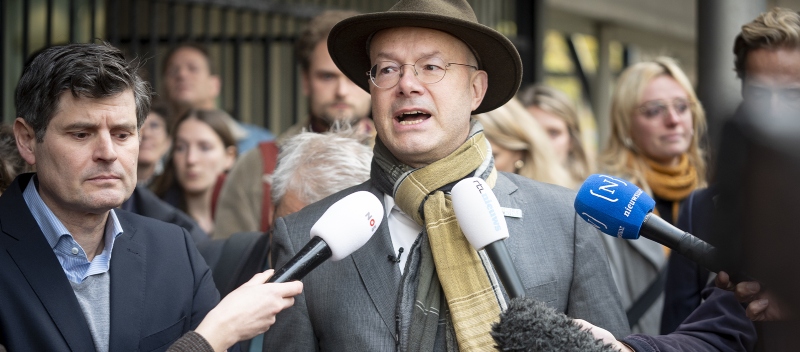Naturalis Museum did it, the University of Amsterdam wants to do it, and Erasmus University is thinking about doing it: cutting ties with Shell. But WUR thinks that’s not the way to go, stated Board President Sjoukje Heimovaara in Resource recently. What do other WUR folk think about it?
‘Mobilize everyone to move in the right direction’
Sjoukje Heimovaara
President of Wageningen University & Research
(From Resource #11); ‘I see the dark side of the fossil industry too. But we are now working with Shell on projects for developing biobased substitutes for fossil materials. That is relevant research. I don’t want to end that collaboration. Doing so might make a good impression in the short term, but it won’t do anything to solve the big problem of climate change in the long term. What we assess case by case is whether a collaboration contributes to our strategic goals, such as stopping climate change, helping secure a fair and healthy food supply, and protecting nature and the planet. (…) We are facing very major transformations (…) which are multifaceted. So we should mobilize everyone we can to move in the right direction.’
‘I don’t take it personally’
Peter Boogaard
Special professor of Environmental Health & Human Biomonitoring
‘I worked for Shell for over 30 years. Since then I have taken early retirement, but one day a week I still do research at WUR as a special professor – facilitated by Shell, as my former employer. I am not ashamed of that. Nor do I take the criticism of academic links with Shell personally. Perhaps it makes a difference that the research I am involved in is not closely related to the oil business but is on something nobody is really against: how to reduce the use of laboratory animals in research into chemicals. The legal requirements entail using a lot of animals: around 2000 to 2500 laboratory animals for each substance. We are trying to develop an alternative with which we can get results that are more relevant to humans without using laboratory animals.’
‘Burning is the worst thing you can do with petroleum. But fuels are not the only things made from petroleum. Other things like the brake fluid and lubricating oil your electric car needs are produced from it too. And so are lots of other indispensable products. We really won’t get rid of petroleum for some years to come.
People are mistaken if they think boycotting Shell will speed up the energy transition. On the contrary: at the sector level, European companies such as BP and Shell are actually pioneers. Even if a larger proportion of their investments still goes to fossil fuels it does not change the fact that they invest vast amounts of money in sustainability. Incidentally, even the much laxer US companies like ExxonMobil and Chevron are minor players compared to state oil companies like Saudi Aramco or Qatar Petroleum – they have no shareholders to answer to. The way Shell is now being singled out is largely due to ignorance about such things.’
‘Every euro for a good cause is worth having’
Rob Manders
business analyst in the Facility Management Department
‘Every euro WUR brings in from Shell can’t be invested in fossil fuels. Shell is doing some good things. Critics call it greenwashing, but I can’t see what is wrong with Shell’s investments in sustainable projects.
As a business analyst, I am all for taking things one step at a time. Then you can evaluate and see how well something works. You can’t turn Shell into a green organization overnight.
We also still need fossil fuels and materials to produce renewable energy. How do you think wind turbines and solar panels are made? We are in the midst of a transition and we’ve got to pull out all the stops. Every euro for a good cause is worth having.’
‘Ignoring Shell is not the solution’
Sanne Vermeij
Student Council President (her personal opinion)
‘In the Student Council, opinions on this proposition are very divided, which is why I am speaking in a personal capacity.
I understand where the proposition is coming from and that people question collaborations with a company like Shell that makes money in the fossil industry. But I still don’t think it is the best choice to cut all ties.
If you can explore alternatives to fossil fuels in collaboration with this kind of company, and work towards a more sustainable energy supply, that has to be a good thing. When doing so, it is important not to let a powerful company like Shell influence the outcomes of research. But I don’t think it solves anything to bury your head in the sand, ignore Shell and let them carry on the way they are now.’
‘Damages the credibility of science’
Susanne van Donk
researcher at Wageningen Marine Research
‘I am against collaborating with companies that continue to invest heavily in new or existing fossil sources and make sky-high profits from this, but don’t use them to invest substantially in renewable sources. Collaborating with an industry that we know to be destructive damages the credibility of science. It also enables companies to polish up their image without actually changing. This legitimizes the companies responsible for the climate problem. Everyone agrees that collaborating with Phillip Morris to fight lung cancer is not an option. So why is collaborating with Shell to tackle CO2 emissions perfectly normal?’
‘WUR plays a knowing role in greenwashing’
Brigitte Wear
Master’s student of Climate Studies
‘WUR’s cosy links with fossil fuel companies are unsettling. It makes for a contradictory public image: the slogan is “for quality of life” and WUR actively presents itself as the planet’s most sustainable university. WUR also carries out research on climate justice and ethical transitions away from fossil fuels. For fossil fuel companies, the money spent on “green” research at WUR and other research institutes is negligible and distorts the full picture. These companies still run on the exploitation of natural resources and people, especially people of the Global South and people of colour. By accepting and welcoming the influence of fossil fuel companies, WUR plays a knowing role in greenwashing, becomes complicit in a widespread public image scam, and plays a part in delaying climate action.’
Have your say: debate and symposium
WUR is organizing a debate with the Executive Board and Scientists4Future Wageningen for students and staff on whether we should break links with the fossil-fuel industry.
14 March from 12:00 to 13.30 in Omnia
Scientists4Future Wageningen is organizing a symposium on ‘observing, understanding and problematizing the relationships between Dutch universities and Big Oil’. With Vatan Hüzeir and Brigitte Wear.
16 March from 15:00 to 18:00 in Gaia

 Illustration Marly Hendricks
Illustration Marly Hendricks 


I personally do not agree with some of the comments made on the issue. The research that WUR is part of is helping Shell continue in business which is doing more harm than good. I think WUR needs to make a statement that we are living in the times of climate emergency and fossil fuel companies cannot continue to make profit from the planet wreckage. Fossil fuel companies are directly causing the ecological crisis while making sky rocketing profits. The project collaborations at WUR with fossil fuel industries provide them a way to show that fossil fuel companies are working towards sustainability while they are the reason for the crisis at hand and we should condemn helping them look sustainable to the public and hence expedite climate action.